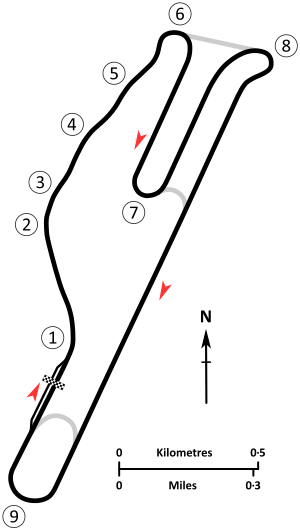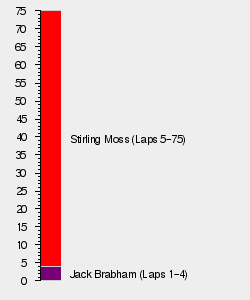1960 United States Grand Prix facts for kids
Quick facts for kids 1960 United States Grand Prix |
|||
|---|---|---|---|
| Race 10 of 10 in the 1960 Formula One season | |||
 |
|||
| Race details | |||
| Date | November 20, 1960 | ||
| Official name | III Grand Prix of the U.S. | ||
| Location | Riverside International Raceway Riverside, California |
||
| Course | Permanent road course | ||
| Course length | 5.271 km (3.275 mi) | ||
| Distance | 75 laps, 395.325 km (245.643 mi) | ||
| Weather | Temperatures up to 75.9 °F (24.4 °C); Wind speeds up to 11.39 mph (18.33 km/h) |
||
| Pole position | |||
| Driver | Lotus-Climax | ||
| Time | 1:54.4 | ||
| Fastest lap | |||
| Driver | Cooper-Climax | ||
| Time | 1:56.3 on lap 71 | ||
| Podium | |||
| First | Lotus-Climax | ||
| Second | Lotus-Climax | ||
| Third | Cooper-Climax | ||
|
Lap leaders
 |
|||
The 1960 United States Grand Prix was an exciting Formula One car race. It took place on November 20, 1960, at the Riverside International Raceway in Riverside, California. This race was the final event of the 1960 World Championship of Drivers. It was also the ninth race for the 1960 International Cup for Formula One Manufacturers.
Contents
Race Highlights: What Happened?
The 1960 United States Grand Prix faced some challenges. The race promoter, Alec Ulmann, had trouble getting many people to come. This was similar to the year before in Sebring, Florida. People in California were not very familiar with open-wheeled race cars or the European drivers. Also, local news media did not promote the event much.
The Riverside Track and Top Drivers
The race was held near Box Springs Mountain in the desert, east of Los Angeles. The Riverside International Raceway track was known for a tough uphill section right after the start line. Local driver Dan Gurney was a favorite among the 25,000 fans who came to watch.
Jack Brabham had already won his second World Championship before this race. He was there with his teammate Bruce McLaren. They both drove for the factory Cooper team, using Climax engines. Team Lotus had cars for Jim Clark, Innes Ireland, and John Surtees. Another Lotus car, painted Scottish blue, was driven by Stirling Moss for the Rob Walker team. BRM had three cars for Jo Bonnier, Graham Hill, and Dan Gurney.
Ferrari's Decision and Qualifying
The famous Enzo Ferrari decided not to bring his cars to this race. The championship was already decided. He felt it was better to prepare for the new 1.5-liter Formula rules coming in 1961. However, Ferrari's drivers, Phil Hill and Wolfgang von Trips, were allowed to race with other teams. Phil Hill especially wanted to keep his third-place spot in the championship.
Stirling Moss was the fastest in qualifying, earning the pole position. Jack Brabham and Dan Gurney started right behind him on the front row. Phil Hill was surprised by how different the Cooper car felt compared to his usual Ferrari. Even so, he managed to qualify in thirteenth place.
The Race Begins: Early Drama
On race day, the weather was almost perfect. When the race started, Jack Brabham took the lead into the first turn. Dan Gurney and Stirling Moss followed closely. The crowd was amazed by the speed of the F1 cars.
Some cars had trouble right at the start. The Coopers of Phil Hill and Olivier Gendebien stalled but were restarted. On lap 4, John Surtees spun his Lotus car. This caused damage to his teammate Jim Clark's car, which needed a new nosecone.
Brabham's Troubles and Moss Takes the Lead
Jack Brabham had a problem with his car. He had put too much fuel in the tank to avoid running out, like he did in a previous race. This caused extra fuel to spill and catch fire from the hot exhaust. He made two pit stops to try and fix it, but the problem continued.
With Brabham having issues, Stirling Moss moved far into the lead. Then, Dan Gurney's BRM car had an engine problem and had to stop. Moss's teammate, Jo Bonnier, moved into second place. Innes Ireland, Graham Hill, and Jim Hall (who was in his first Grand Prix) were also doing well.
Before the halfway point of the 75-lap race, Graham Hill had to stop because of a broken gearbox. Jo Bonnier also started to slow down due to an engine problem. Meanwhile, Jack Brabham was pushing hard after his pit stops. He managed to finish in fourth place, right behind his teammate Bruce McLaren. Phil Hill was running fifth for a while, but a spin dropped him behind Bonnier. Bonnier still managed to finish and earn two points.
Moss Wins and Championship Results
Stirling Moss won the race easily. This was the last race for the 2.5-liter engine rules. His victory helped him finish third in the championship for the second year in a row. It was his fourteenth win under those rules.
After the race, promoter Alec Ulmann used his own money to pay the prize money and fees. Stirling Moss received $7,500, which was a lot of money back then. Even though some suppliers had to wait, everyone was paid in full. The next year, in 1961, the United States Grand Prix found a permanent home in Watkins Glen, New York, with many loyal fans. Formula One racing would eventually return to California in 1976, with the United States Grand Prix West in Long Beach.
Race Results: Who Finished Where?
Qualifying Times
This table shows how fast each driver was in qualifying to decide their starting position.
| Pos | No | Driver | Constructor | Time | Gap |
|---|---|---|---|---|---|
| 1 | 5 | Lotus-Climax | 1:54.4 | — | |
| 2 | 2 | Cooper-Climax | 1:55.0 | +0.6 | |
| 3 | 16 | BRM | 1:55.2 | +0.8 | |
| 4 | 15 | BRM | 1:55.6 | +1.2 | |
| 5 | 12 | Lotus-Climax | 1:55.6 | +1.2 | |
| 6 | 11 | Lotus-Climax | 1:56.6 | +2.2 | |
| 7 | 10 | Lotus-Climax | 1:57.0 | +2.6 | |
| 8 | 7 | Cooper-Climax | 1:57.2 | +2.8 | |
| 9 | 6 | Cooper-Climax | 1:57.2 | +2.8 | |
| 10 | 3 | Cooper-Climax | 1:57.4 | +3.0 | |
| 11 | 17 | BRM | 1:57.6 | +3.2 | |
| 12 | 24 | Lotus-Climax | 1:58.2 | +3.8 | |
| 13 | 9 | Cooper-Climax | 1:58.8 | +4.4 | |
| 14 | 8 | Cooper-Climax | 1:59.0 | +4.6 | |
| 15 | 14 | Cooper-Climax | 1:59.6 | +5.2 | |
| 16 | 26 | Cooper-Maserati | 2:01.4 | +7.0 | |
| 17 | 21 | JBW-Maserati | 2:02.2 | +7.8 | |
| 18 | 23 | Scarab | 2:02.6 | +8.2 | |
| 19 | 18 | Cooper-Maserati | 2:03.2 | +8.8 | |
| 20 | 25 | Cooper-Ferrari | 2:03.4 | +9.0 | |
| 21 | 4 | Cooper-Climax | 2:04.4 | +10.0 | |
| 22 | 20 | Maserati | 2:05.4 | +11.0 | |
| 23 | 19 | Cooper-Maserati | 2:06.6 | +12.2 | |
| Source: | |||||
Final Race Standings
This table shows the results of the main race.
| Pos | No | Driver | Constructor | Laps | Time/Retired | Grid | Points |
|---|---|---|---|---|---|---|---|
| 1 | 5 | Lotus-Climax | 75 | 2:28:52.2 | 1 | 8 | |
| 2 | 10 | Lotus-Climax | 75 | + 38.0 | 7 | 6 | |
| 3 | 3 | Cooper-Climax | 75 | + 52.0 | 10 | 4 | |
| 4 | 2 | Cooper-Climax | 74 | + 1 Lap | 2 | 3 | |
| 5 | 15 | BRM | 74 | + 1 Lap | 4 | 2 | |
| 6 | 9 | Cooper-Climax | 74 | + 1 Lap | 13 | 1 | |
| 7 | 24 | Lotus-Climax | 73 | + 1 Lap | 12 | ||
| 8 | 14 | Cooper-Climax | 73 | + 2 Laps | 15 | ||
| 9 | 26 | Cooper-Maserati | 72 | + 3 Laps | 16 | ||
| 10 | 23 | Scarab | 70 | + 5 Laps | 18 | ||
| 11 | 25 | Cooper-Ferrari | 69 | + 6 Laps | 20 | ||
| 12 | 7 | Cooper-Climax | 69 | + 6 Laps | 8 | ||
| 13 | 20 | Maserati | 68 | + 7 Laps | 22 | ||
| 14 | 8 | Cooper-Climax | 68 | + 7 Laps | 14 | ||
| 15 | 18 | Cooper-Maserati | 66 | + 9 Laps | 19 | ||
| 16 | 12 | Lotus-Climax | 61 | + 14 Laps | 5 | ||
| Ret | 17 | BRM | 34 | Gearbox | 11 | ||
| Ret | 19 | Cooper-Maserati | 29 | Ignition | 23 | ||
| Ret | 21 | JBW-Maserati | 20 | Engine | 17 | ||
| Ret | 16 | BRM | 18 | Blown core plug | 3 | ||
| Ret | 4 | Cooper-Climax | 11 | Transmission | 21 | ||
| Ret | 6 | Cooper-Climax | 6 | Spun Off | 9 | ||
| Ret | 11 | Lotus-Climax | 3 | Accident | 6 | ||
|
|
|||||||
Championship Standings After the Race
These tables show how the drivers and constructors ranked after the 1960 United States Grand Prix.
|
|
||||||||||||||||||||||||||||||||||||||||||||||||||||
- Notes: Only the top five positions are included for both sets of standings. Only the best 6 results counted towards each Championship. Numbers without parentheses are Championship points; numbers in parentheses are total points scored.
Images for kids
See also
 In Spanish: Anexo:Gran Premio de los Estados Unidos de 1960 para niños
In Spanish: Anexo:Gran Premio de los Estados Unidos de 1960 para niños
 | Tommie Smith |
 | Simone Manuel |
 | Shani Davis |
 | Simone Biles |
 | Alice Coachman |


